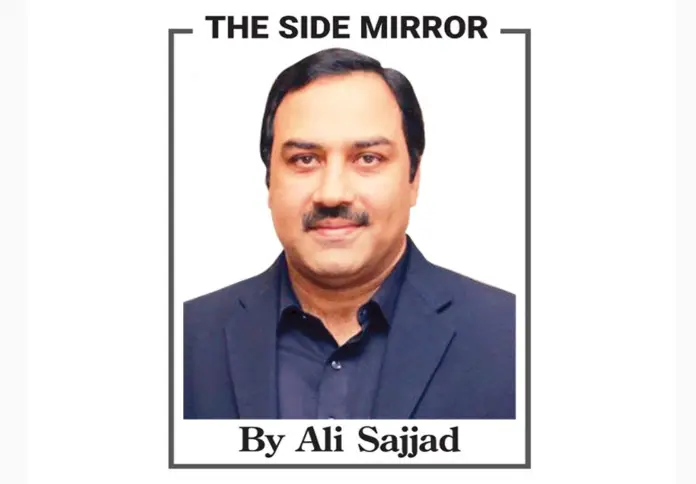Someone sent me the link of a byline story of Umer Cheema, published in The News on August 1, 2022.
“It’s just like reading an affidavit of the journalist against a respondent,” I told a friend, who sought my opinion on the story. My friend ended the discussion. He was visibly dismayed.
The easiest thing in drawing room gossip is to level allegations against anyone you dislike. There are plenty of serial litigants, who, on the basis of these allegations, file complaints with law enforcement agencies, which are later either withdrawn or turned down by the courts of law. These applications, however, provide fodder to the media to assassinate the character of respondents.
I remember the case of former prime minister Raja Parvez Ashraf, who was consistently referred to as Raja Rental when references against him were being prosecuted in NAB courts. He stood innocent in all references. His innocence is enough to prosecute the mindset working in journalism.
Umer Cheema drives the origin of his story from a “complaint” filed against an officer with the Foreign Office. The complaint was later withdrawn but it leaves enough grounds for him to “break visa scam”. The story is about the alleged role of a Foreign Service Group officer in human smuggling. The former complainant is “also a former government servant who himself is into visa business”.
Human smuggling, unlike yellow journalism, is a cognizable crime, and the Federal Investigation Agency (FIA), not the Foreign Office, is authorized to investigate into it. The reporter should have grilled the former complainant for his inability to go for wrong forums – first, the Foreign Office, and later Umer Cheema.
The story tells that the officer in question tried to “influence the European embassies in Islamabad to get visas for Pakistanis. He allegedly tried to send as many as 11 individuals to Spain”.
Let me take a glass of water before I can comment on how someone’s “efforts” can become a journalistic story. It is not uncommon in such kind of journalism when a certain journalist says that Zardari is thinking about new elections and Maulana Fazl ur Rehman is not thinking on these lines. Journalism is another occupation of reading a coffee cup.
Wait for another bombshell:
“Before that, he was Pakistan’s ambassador in Czech Republic and his track record there was not clean either.”
The story does not explain anything about the “dirt” related to Czech Republic.
Having clean track record is a blessing in Pakistan. Most of the journalists have clean track record. I hear that only a few have been convicted by a court of law for their false stories. I hope Umer Cheema knows the list well. He should have explained what made the officer’s track record smudged, or should have dropped the accusation.
The story implicates the officer in offences like introducing the complainant to the ambassadors of several countries. The officer is accused of offering the complainant with facilitating him in issue “of visit, work and residency visas for Italy, the Czech Republic, Spain, Poland and South Korea”.
The crux of the story is that complainant made payments to the officer through banking channels for visas. Perhaps this is a monetary dispute between the former complainant and the officer, which has been made a visa scam story.
The complainant’s “ordeal” ends here and later on, the story took the route to Prague, where the officer in question allegedly smuggled 10 Pakistanis with a Qawwal troupe. According to the story, those 10 people were also cheated by the officer.
The reporter should have spoken to the victims, instead of narrating the story without a source.
Who cares?
The complainant declares the officer “a persona non-grata (sic) in several of the countries in his previous postings”.
Several? 10? 20? 200? Or only two? All these figures denote “several” to us. Do those countries have names? Is it extraordinary to be declared “a persona non grata”? Was he declared “a persona non grata” for his alleged human smuggling?
The story says that the officer sent a request to the Spanish embassy for “fake” lawyers’ visas.
If this is a serious offence, he must be punished.
The reporter seems dismayed that the officer was exonerated from several complaints because of his batchmates’ influence. Journalism thrives on conspiracy theories.
At the end of the story, the reporter tells that the “Ministry of Foreign Affairs ordered a fact-finding inquiry to determine the veracity of allegations levelled by the complainant; he has withdrawn his complaint apparently in an out-of-office settlement with the officer”.
The Foreign Ministry has a dedicated spokesperson cell. The reporter should have contacted them to make his story credible and journalism authentic. Instead, he relied on an unnamed source.
I seldom write on stories; instead, I comment on journalistic practices.
But I had to write this piece as “reading through the story is like touring through the world of yellow journalism and the way it works”






